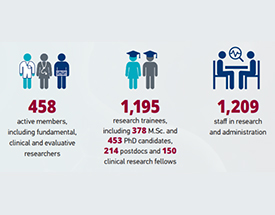Breadcrumb
- Home /
- About Us /
- Annual Reports /
- 2020 Annual Report /
- 2020 Annual Report /
- COVID-19 : Our researchers answer the call

RI-MUHC ANNUAL REPORT 2020
null COVID-19 : Our researchers answer the call
When the COVID-19 pandemic hit, much of the world locked down. But that has not kept scientists at the Research Institute of the McGill University Health Centre (RI-MUHC) from focusing their energies on a new imperative: resolving challenges raised by the pandemic.
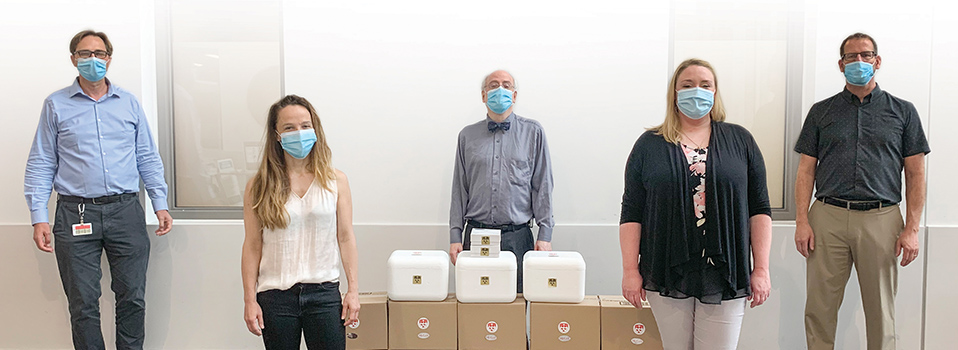
Many staff, trainees and funding partners have also pivoted in their work to support this vital research. The McGill University Health Centre (MUHC) Foundation, for instance, quickly organized seed funding for dozens of projects, including several below, through the McGill Interdisciplinary Initiative in Infection and Immunity (MI4) Emergency COVID-19 Research Fund (ECRF). Here we consider only a few frontline projects launched at the RI-MUHC with the aim of locking down the coronavirus.
- Blocking the virus
- Testing hydroxychloroquine
- Cardiac conditions and the coronavirus
- Tracking international approaches to COVID-19
- Made-in-Canada COVID-19 tests
- Supporting healthcare workers
- First UV-disinfection robot tested in Canada
BLOCKING THE VIRUS
The coronavirus binds to human cells using what is called a “spike” protein, which creates a means for the virus to enter human cells. Researchers around the world are working to develop a vaccine that will interfere with this spike protein, prohibiting the virus from binding.
Momar Ndao (DVM, PhD), Martin Olivier (PhD) and Michael Reed (PhD), colleagues in the Infectious Diseases and Immunity in Global Health Program, are developing a novel approach to obstruct this protein. They lead an effort to explore the use of both the current tuberculosis vaccine and an adenoviral vaccine—already in clinical trials for human use—that was developed to combat Ebola, malaria and the human immunodeficiency viruses. They are studying whether these vaccines, either alone or in combination, can be used to deliver the COVID-19 spike protein and generate a sustained immune response that effectively blocks the coronavirus from attaching to and entering human cells, thereby preventing disease.
“With vaccines already approved for human use, we don’t need to wait as long for regulatory approval,” says Dr. Ndao.
Funding: MUHC Foundation and partners (MI4 ECRF)
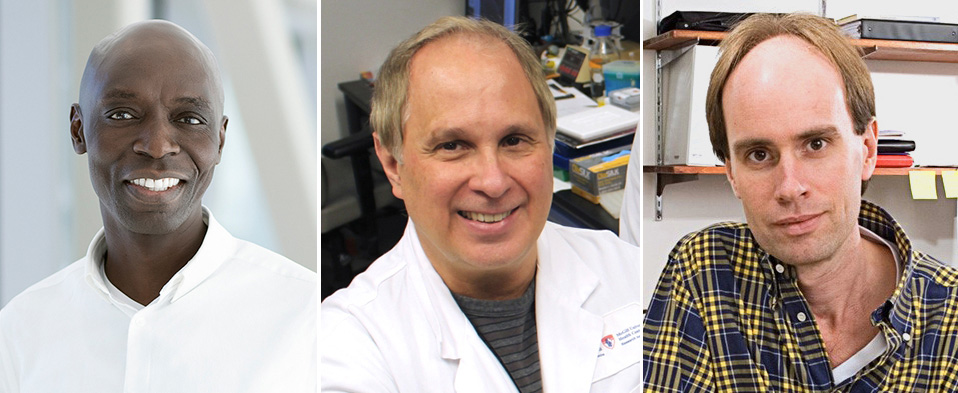
TESTING HYDROXYCHLOROQUINE
In March 2020 Drs. Todd C. Lee, Emily G. McDonald and Matthew P. Cheng, members of the Infectious Diseases and Immunity in Global Health Program, launched a clinical study coordinated with another in Minnesota, U.S., to explore the potential of hydroxychloroquine in different contexts. Their first trial focused on post-exposure prophylaxis—preventing infection if someone had been exposed—and their second on whether early community treatment improved disease outcome. These were the first randomized controlled trials for COVID-19 to recruit patients in Canada, and the first completed.
The post-exposure prophylaxis trial gained worldwide attention when published in the New England Journal of Medicine in June. The second appeared in the Annals of Internal Medicine in July.
“Despite a lot of excitement and promise for the drug, we found that hydroxychloroquine does not seem to be effective as either post-exposure prophylaxis or to reduce symptoms in early disease,” says Dr. McDonald. Dr. Lee adds, “We’re still pooling data with international trials to see if there were fewer hospitalizations for those who received early treatment, but it may be time to move on to evaluate other candidate drugs.”
Funding: MUHC Foundation (MI4 ECRF) and MUHC Clinical Practice Assessment Unit
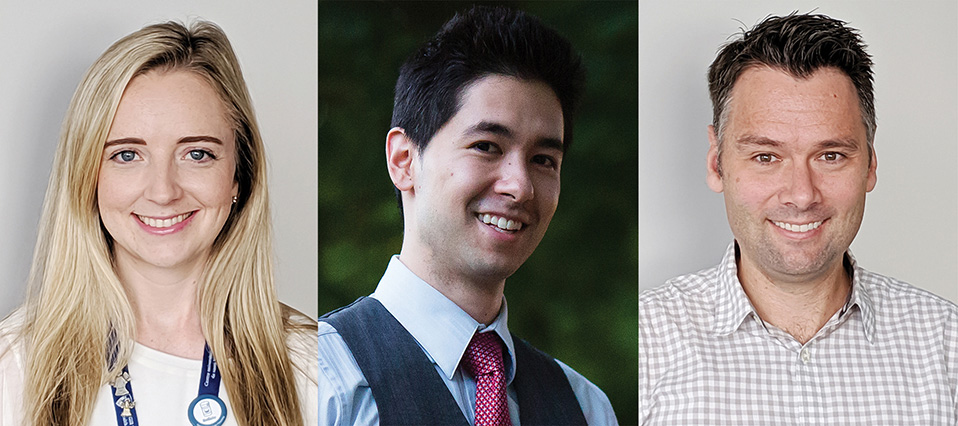
CARDIAC CONDITIONS AND THE CORONAVIRUS
Dr. Abhinav Sharma of the Cardiovascular Health Across the Lifespan Program is concerned with management of cardiac conditions during the pandemic. “There is controversy around the use of commonly used blood pressure medications, specifically angiotensin converting enzyme (ACE) inhibitors and angiotensin receptor blockers (ARB),” he explains. “The COVID-19 virus needs the protein that these drugs bind to in order to enter the cells.
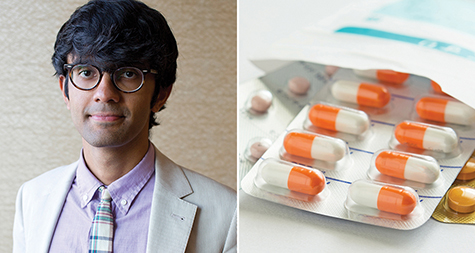
One hypothesis suggests that people on these medications could experience a more severe infection. Another proposes that these medications may be beneficial, reducing inflammation and fibrosis. Dr. Sharma is studying the effect of withdrawing ACE inhibitors to learn how that impacts patients hospitalized with COVID-19. “Our study will determine if temporarily withholding these blood pressure medications is safe and improves patient outcomes,” he says.
Funding: MUHC Foundation (MI4 ECRF) and MUHC Division of Cardiology
TRACKING INTERNATIONAL APPROACHES TO COVID-19
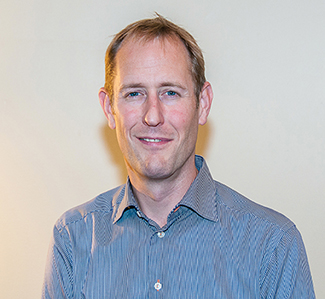
Dr. David Buckeridge, a researcher in the Metabolic Disorders and Complications Program, is designing new methods of using artificial intelligence to survey online media. He aims to understand which countries are implementing which kind of control measures, when they’re doing it, and how people and communities are reacting to it.
“We use online media to build portraits of how countries are controlling the pandemic around the world,” says Dr. Buckeridge, “and then we try and tie in more traditional data around numbers of cases and deaths to see to what extent those efforts are having an effect.”
His study aims not only to identify clear differences and patterns regarding approaches used around the world, but also to track popular reactions to those approaches and issues at the forefront in the media.
Funding: The Canadian 2019 Novel COVID-19 Rapid Research Funding Opportunity
MADE-IN-CANADA COVID-19 TESTS
When COVID-19 hit Canada, most testing kits were made by multinational corporations without obligation to meet Canadian needs. Old hockey buddies Don van Meyel (PhD) of the Brain Repair and Integrative Neuroscience Program and Martin Schmeing (PhD), a biochemistry professor at McGill University, led a team of talented McGill researchers to produce COVID-19 testing kits for which all essential test components were made in Canada.

A pilot project to deliver 15,000 tests to Optilab MUHC served as proof of concept, and collaboration with scientists at the National Research Council is enabling scale-up to produce millions of tests.
"We want to be able to produce and distribute these tests nationwide when they are needed,” says Don van Meyel, who directs the Centre for Translational Biology at the RI-MUHC. “Decisions about who and when to test in Canada should be driven by strong science and public health policy, not by limitations in the number of tests available.”
Funding: MUHC Foundation (MI4 ECRF), McGill Faculty of Science, National Research Council of Canada, Innovation Science and Economic Development Canada
SUPPORTING HEALTHCARE WORKERS
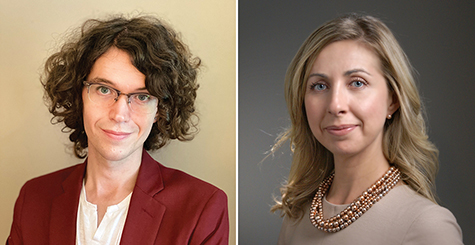
Healthcare professionals have found themselves under tremendous pressure during the COVID-19 pandemic. Jason Harley (PhD) of the Injury Repair Recovery Program and Tina Montreuil (PhD, PsyD) of the Child Health and Human Development Program have developed a survey of the support and coping strategies that healthcare professionals are using, in order to help inform hospital networks and promote practices that would best support these workers. “That means having a better understanding of the stressors and the psychological distress that healthcare professionals are experiencing,” says Jason Harley.
The pair aims to shed light on issues of physical and emotional exhaustion and high absenteeism among healthcare workers. “The idea is to gain greater insight into what is really going on in the system so thsat we’re better able to support the hospitals and their workers,” adds Tina Montreuil.
Funding: MUHC Foundation and partners (MI4 ECRF)
FIRST UV-DISINFECTION ROBOT TESTED IN CANADA
Like the researchers they support, many RI-MUHC administrative staff took initiative in the pandemic. Notably, our biomedical engineering and environmental health and safety teams worked with MUHC housekeeping and infection control on novel methods of disinfection.
When Rami Tohme, director of Infrastructure and Biomedical Engineering (RI-MUHC), came across a robot that disinfects using ultraviolet light at a medical show in Germany, he saw it as a technology that could help hospitals at home lower their infection rates. Dr. Bruce Mazer (Translational Research in Respiratory Diseases Program) agreed, and invited his team to help in the first evaluation of this robot inside a Canadian hospital.
“Our job was not to highlight its capacity for disinfection, because that’s already proven,” says Rami Tohme. “We wanted to test its capability to disinfect without human intervention.” The evaluation teams delivered a thumbs-up for the acquisition of two robots at the RI-MUHC.

NEXT READ
PREVIOUS READ
